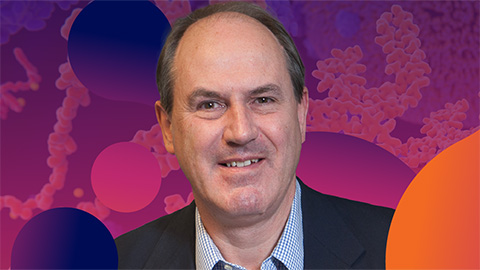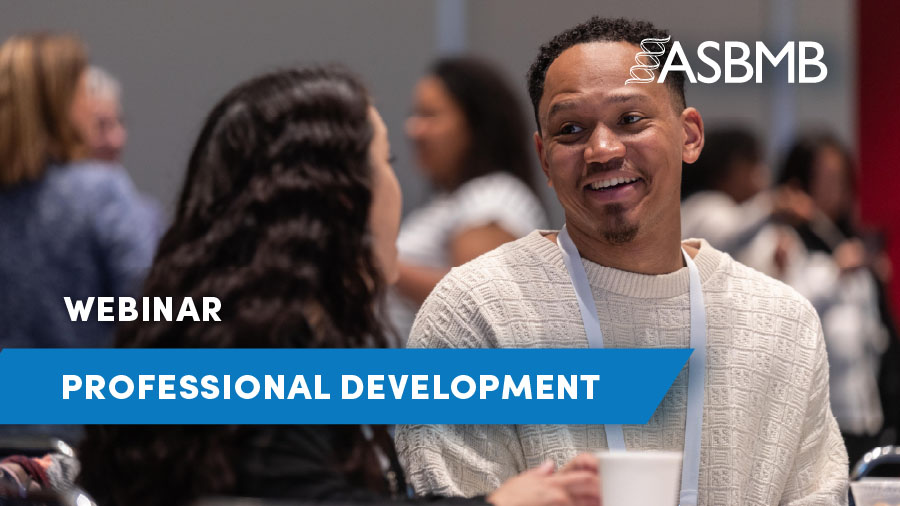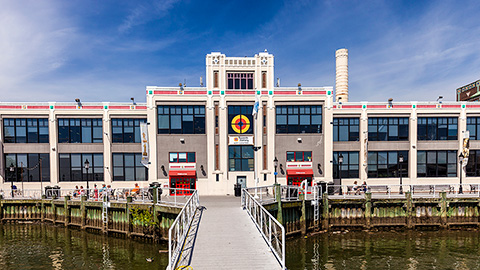Calendar of events, awards and opportunities
Every week, we update this list with new meetings, awards, scholarships and events. If you are looking for announcements from federal funding agencies relating to the COVID-19 pandemic, we are collecting those announcements here.
If you’d like us to feature something that you’re offering to the bioscience community here, email us with the subject line “For calendar.” ASBMB members’ offerings take priority, and we do not promote products/services. Learn how to advertise in ASBMB Today.
Thursdays: Join us for a therapeutic Twitter check-in
These are strange and difficult times. Many of us are under stay-at-home orders. Some are self-quarantined. Some are far from and worried about the people they love. Some are pulling their hair out as they try to juggle homeschooling, mentoring and working from the kitchen table. Join us at 2 p.m. Eastern on Thursdays on Twitter to tell us how you're faring. Our account is @ASBMB, and the hashtag is #ASBMBcheckins.
Video: "Protecting American science — and the international collaborators critical to its success"
The ASBMB policy team recently held a webinar on research security, current legal cases involving scientists, and foreign influences on federally funded research. Lawyer and law professor Frank H. Wu discussed the policy landscape as the National Institutes of Health and the Federal Bureau of Investigation crack down on conflicts of interest and intellectual property theft and lawmakers consider legislation to protect American research. Find out about new reporting and disclosure requirements — and unintended consequences, including racial profiling. Watch the webinar recording here.
Free webinars and courses for aspiring communicators
Poynter has made all of its News University webinars and courses free for college students and educators through May 31. If you're just beginning your science communication career journey, there are primers on grammar and evaluating sources, among others. More advanced courses include, for example, ones on writing for broadcast media and using video. See the available courses.
Virtual seminar series: lipids and lipid signaling
Every Friday at 2 p.m. Eastern
ASBMB Lipid Research Division members John Burke of the University of Victoria and Mike Airola of Stony Brook University have organized a weekly online seminar series to provide "opportunities to graduate students and postdocs who are missing the ability to give talks at conferences” in light of the COVID-19 pandemic. The series is taking place via Zoom. To sign up to attend, add your name and email address to this Google sheet. If you’re interested in presenting, please contact Burke.
Here is the schedule for the next couple of weeks, with links to presenters’ publications:
April 10 | Novel tools to study lipid signaling
Josh Pemberton, Balla lab, NICHHD
Dongjun Liang, Baskin lab, Cornell University
April 17 | Spatiotemporal control of lipid signaling
Reika Tei, Baskin lab, Cornell University
Claudia Mattheus, Daumke lab, Max Delbrück Center for Molecular Medicine
April 6: Webinar on rural health research opportunities
The National Institute on Minority Health and Health Disparities is holding a webinar titled "The Federal Office of Rural Health Policy: Explaining the Role and Discussing Broader HHS Research Opportunities" at 2 p.m.Eastern on April 6. The speaker will be Tom Morris, the associate administrator for rural health policy for the U.S. Department of Health and Human Services. Learn more.
April 6: Submit a video about your #ASBMB2020 poster
Though the 2020 ASBMB Annual Meeting has been canceled, we can still come together virtually to share our research. Those who were programmed for a poster presentation are invited to participate in a virtual poster session on YouTube. Record a video about your research, upload it to YouTube and then submit your virtual poster presentation to us. See the guidelines.
April 10: Participate in study of science outreach
ASBMB Members Jeanne Garbarino from The Rockefeller University and Niki Woitowich from Northwestern University are teaming up to conduct a large-scale survey study which explores the “science” behind science outreach. This National Science Foundation-sponsored research aims to learn more about how science outreach is valued among scientific researchers, what motivates scientists to participate in science outreach, and will examine how gender and race influence participation. All STEM-based graduate students, postdocs, faculty and staff at two- or four-year colleges or universities are invited to participate. No experience or prior knowledge of science outreach is required to complete the survey. Complete the survey.
April 15: Startup grants from Schering, Thyssen foundations
Schering Stiftung and the Fritz Thyssen Foundation are offering startup grants for new researchers working on "projects in the fields of biochemical, neuroscience or immunological basic research with biomedical implications." Each project grantis worth up to EUR 60,000. Learn more.
April 30: Applications due for NIH DATA Scholar Program
The National Institutes of Health has a new opportunity called the Data and Technology Advancement (DATA) National Service Scholar Program. It's for experienced data and computer scientists/engineers who want to "tackle biomedical data challenges with the potential for substantial public health impact." Participants will work at the NIH offices in Maryland or North Carolina. Learn more.
May 1: Apply for PROLAB travel awards
The Promoting Research Opportunities for Latin American Biochemists program allows Latin American graduate students and postdoctoral fellows to spend up to six months in U.S. or Canadian laboratories. Participants get access to technologies and expertise that may not be readily available in their home countries, allowing them to grow their skills and contribute to building capacity in the life sciences at home. Learn more.
May 6: DOE graduate student program deadline
The U.S. Department of Energy Office of Science Graduate Student Research program is accepting applications from those who wish to do thesis work at participating national labs/facilities. Learn more.
June 1: Deadline for ASBMB's undergraduate diversity scholarship applications
The Marion B. Sewer Distinguished Scholarship for Undergraduates offers financial support to students who demonstrate an interest in the fields of biochemistry and molecular biology and enhance the diversity of science. Students whose social, educational or economic background adds to the diversity of the biomedical workforce or who show commitment to enhancing academic success of underrepresented students are eligible. The scholarship provides up to $2,000 toward undergraduate tuition costs. Learn more.
June 1: Nominations due for Heinrich Wieland Prize
Researchers who have published outstanding work on “biologically active molecules and systems in the areas of chemistry, biochemistry and physiology” are eligible for the 100,000 euro 2020 Heinrich Wieland Prize. Learn more.
June 1: Enter undergrad design challenge
Two institutes at the National Institutes of Health are teaming up with VentureWell to present the 2020 DEBUT Challenge. (DEBUT is short for "Design by Biomedical Undergraduate Teams.") This contest has lost of prize possibilities, with the biggest at $20,000. See the DEBUT website for details.
June 8: Hopkins to host science writers at press club
The Johns Hopkins Institute for Basic Biomedical Sciences is offering a free, daylong program for science writers of all kinds on June 8 at the National Press Club in Washington, D.C. The theme is precision medicine. We can attest that we've found some of our best stories and sources at this annual event. More info.
June 9–10: National Academies workshop on aging and environmental research
The National Academies will be hosting a free two-day workshop titled "Integrating the Science of Aging and Environmental Health Research." In an email announcement, the Academies said speakers will discuss findings about "How environmental exposures influence or mediate aging" and "How aging influences environmentally mediated health outcomes." It will be webcast. Learn more.
July 16–17: Free "train-the-trainers" program
The National Institutes of Health and the Association of American Medical Colleges are presenting their second "Train-the-Trainers" event for advisers, staff members and faculty members who provide guidance to and career-related programming for grad students and postdocs in the life sciences. Advance registration is required, but the program is free. See the agenda.
July 20–29: Free glycobiology training in Brazil
The Institute of Biomedical Sciences at the University of São Paulo will host the São Paulo School of Advanced Science on Glycobiology (SPSAS-GLYC) this summer. The program includes theoretical and practical courses and opportunities for student presentations. The organizers tell us that, of the 72 attendees, 36 will be chosen from applications from Brazil, and the other 36 will be chosen from applications from other countries. All 72 attendees will attend for free, with the SPSAS-GLYC covering their travel and accommodations. Learn more.
Aug. 11: Deadline to apply to HHMI's new program for medically trained scientists
The Howard Hughes Medical Institute will be accepting up to 10 biomedical scientists for its new $120 million research program. According to the announcement we received, the Medically Trained Scientists Program "will offer as many as eight years of support for up to 10 early career scientists who are committed to conducting basic research." See HHMI's site for more details.
Enjoy reading ASBMB Today?
Become a member to receive the print edition four times a year and the digital edition monthly.
Learn moreFeatured jobs
from the ASBMB career center
Get the latest from ASBMB Today
Enter your email address, and we’ll send you a weekly email with recent articles, interviews and more.
Latest in Careers
Careers highlights or most popular articles

Defining JNKs: Targets for drug discovery
Roger Davis will receive the Bert and Natalie Vallee Award in Biomedical Science at the ASBMB Annual Meeting, March 7–10, just outside of Washington, D.C.

Upcoming opportunities
No matter where you are in your career and what future path you aspire to, everyone needs leadership skills. Join ASBMB for practical strategies for building and practicing leadership skills.

Close out ASBMB 2026 with a bang
The closing reception of the 2026 ASBMB Annual Meeting will be held at the Torpedo Factory Art Center in Alexandra, Virginia.

Redefining lipid biology from droplets to ferroptosis
James Olzmann will receive the ASBMB Avanti Award in Lipids at the ASBMB Annual Meeting, March 7–10, just outside of Washington, D.C.

Creating change in biochemistry education
Pamela Mertz will receive the ASBMB William C. Rose Award for Exemplary Contributions to Education at the ASBMB Annual Meeting, March 7-10 in Washington, D.C.

Trainee mentorship as immortality
Suzanne Barbour will receive the ASBMB Sustained Leadership Award at the ASBMB Annual Meeting, March 7-10 in Washington, D.C.
